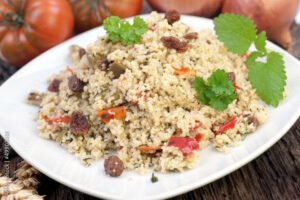Bulgar: What You Need to Know

Bulgur is a type of whole grain that is commonly used in Mediterranean and Middle Eastern cuisine. It is made from cracked wheat that has been partially cooked and then dried. Bulgur is rich in nutrients and has a nutty flavor and chewy texture that makes it a popular ingredient in a variety of dishes.
History and Origin of Bulgur
Bulgur has a long and fascinating history, dating back to the ancient civilizations of Mesopotamia, which is now modern-day Iraq. It was a staple food for the Sumerians, who ground wheat into small pieces and cooked it in water. The Babylonians also used bulgur in their cuisine, and it was a popular food item in the Middle East during the time of the Ottoman Empire.
Health Benefits of Bulgur
Bulgur is a healthy grain that is rich in nutrients. It is an excellent source of dietary fiber, protein, and essential vitamins and minerals. One cup of cooked bulgur contains about 150 calories, 8 grams of protein, and 6 grams of fiber. Bulgur is also a good source of iron, magnesium, and vitamin B6.
The high fiber content in bulgur can help regulate digestion and prevent constipation. The fiber also helps control blood sugar levels and may reduce the risk of developing type 2 diabetes. The magnesium in bulgur is important for bone health, while the iron helps transport oxygen in the blood.
Uses of Bulgur
Bulgur is a versatile grain that can be used in a variety of dishes. It can be cooked and served as a side dish, or used as a base for salads and stews. It is a common ingredient in tabbouleh, a Middle Eastern salad made with parsley, tomatoes, and onions. Bulgur can also be used as a meat substitute in vegetarian dishes, such as burgers and meatballs.
To cook bulgur, it is typically soaked in water or broth for about 30 minutes to soften it. It can then be cooked on the stove or in a rice cooker until tender. Cooked bulgur can be stored in the refrigerator for up to five days, making it a convenient ingredient to have on hand for quick and easy meals.
Bulgur is a healthy and nutritious whole grain that has been a staple food in Middle Eastern cuisine for centuries. It is a rich source of dietary fiber, protein, and essential vitamins and minerals. With its nutty flavor and chewy texture, bulgur can be used in a variety of dishes, from salads and stews to vegetarian burgers and meatballs. Whether you are looking for a healthy side dish or a meat substitute for your favorite recipe, bulgur is a great option to add to your diet

Comments